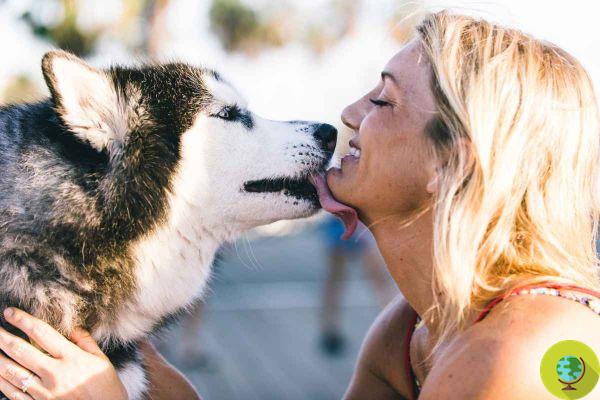
According to new scientific research, dogs, cats and humans could pass on a range of dangerous bacteria and genes that are resistant to antibiotics. Among these there would be Escherichia coli, but not only, as proven by the tests conducted by the researchers
Don't store avocado like this: it's dangerous
Our beloved pets show us their love in many ways, one of these are "kisses", the licks that are almost always given to us immeasurably.
Why our animals lick us was also explained by veterinarians, but according to the researchers of the University of Lisbon and the veterinarians of the Royal Veterinary College, such direct contact could contribute to the transmission of bacteria strains from owner to dog and vice versa which could be risky for the health of both, being some of them resistant to potent antibiotics such as penicillin and cephalosporins.
The experts - who will present data from research conducted at the Eureopean Congress of Clinical Microbiology & Infectious Diseases to be held in Lisbon from 23 to 26 April - therefore involved 41 Portuguese and 42 British families with animals in the study and analyzed every four months between faecal samples from a total of 2018 people, 2020 dogs and 114 cats in 85 and 18. The results showed that 15% of the animals and 13% of the owners who shared the same house were affected by infections caused by Enterobacteriaceae ESBL and AmpC during that time.
Index
But is the dog really the problem?
No, not at all, because animals in all this are not the scapegoat and it is good to underline it, indeed dogs and cats who share our days with us and the same roof risk being doubly victims of the problem which exists not in the licking of our four-legged friend, but in antibiotic resistance as such.
These antibiotic-resistant pathogens, which greatly reduce the effectiveness of a treatment, are now everywhere, in the soil and in the water, and our dog will certainly not amplify the problem. Indeed, the latter is itself the victim of a phenomenon amply increased by the human being. We are therefore wary of excessively alarmist headlines.
As specified by the Istituto di Sanità Superiore antibiotic resistance is one of the main public health problems worldwide today.
So shouldn't we be licked by our pet anymore?
Absolutely not, rather it is important to remember to put into practice, in everyday life, the basic rules of hygiene when you have an animal at home, such as washing your hands after caressing it or after having collected its needs, be it dog or cat. These simple gestures make it possible to minimize the risks of a transmission of resistant bacteria or genes which, let us remember once again, can affect not only us owners, but also our furry ones, as the study has shown.
What does this study teach us about the transmission of antibiotic-resistant bacteria?
This study reinforces the need to practice good hygiene with pets. And above all it reminds us to reduce the use of unnecessary antibiotics.
Not all known dangerous strains, for example most of the Escherichia coli are harmless, however the resistant ones represent a real problem for health, having multiplied and spread for a whole series of causes including the excessive use of human antibiotics. and veterinarians.
Even before the COVID-19 pandemic, antibiotic resistance was one of the greatest threats to public health because it can make conditions such as pneumonia, sepsis, urinary tract infections and wounds incurable "
said Dr. Juliana Menezes, one of the researchers on the study.
Follow your Telegram | Instagram | Facebook | TikTok | Youtube
Read also:
- Antibiotic resistance: it is already one of the main causes of death in the world, the shock data
- The antibiotic resistance pandemic is causing more and more Bangladeshi children to die of pneumonia


























